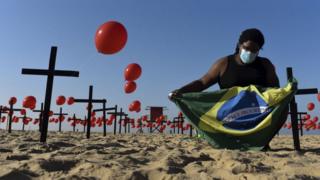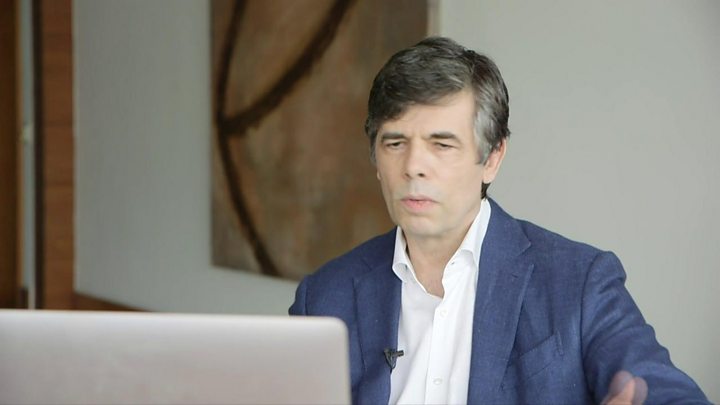 Image copyright
Anadolu Agency/Getty
Image caption
A tribute to the victims was held at Rio de Janeiro's Copacabana beach
Image copyright
Anadolu Agency/Getty
Image caption
A tribute to the victims was held at Rio de Janeiro's Copacabana beach
Brazil has recorded more than 100,000 deaths linked to Covid-19, the world's second-highest figure, as the outbreak in the country shows no sign of easing.
The virus killed 50,000 people in three months, but that number doubled in just 50 days. There have been more than three million confirmed cases so far.
The pandemic is yet to peak but shops and restaurants have already reopened.
President Jair Bolsonaro has downplayed the impact of the virus and opposed measures that could hit the economy.
The far-right leader, who caught the disease himself and recovered, fought restrictions imposed by state governors to curb Covid-19, and has frequently joined crowds of supporters, at times without a face mask.
Experts have complained of a lack of a co-ordinated plan by the Bolsonaro government as local authorities now focus on restarting the economy, which is likely to boost the spread of the virus.
How is Brazil responding to the crisis?
The health ministry is being led by an army general with no experience in public health. Two earlier ministers, both physicians, left the job after disagreeing with the president over social distancing measures and the use of hydroxychloroquine as a treatment, though studies say it is ineffective and even dangerous.
President Bolsonaro - who has called Covid-19 a "little flu" and has been criticised at home and abroad for his response to the outbreak - said he recovered from his own infection thanks to the anti-malarial drug.
"We should be living in despair, because this is a tragedy like a world war. But Brazil is under collective anaesthesia," Dr José Davi Urbaez, a senior member of the Infectious Diseases Society, told Reuters news agency.
"The government's message today is: 'Catch your coronavirus and if it's serious, there is intensive care.' That sums up our policy today."
Brazil has had 100,477 virus-related deaths and 3,012,412 cases, according to the health ministry, though the numbers are believed to be much higher because of insufficient testing. Only the United States has higher figures.

Media playback is unsupported on your device
Where are the hotspots?
Cases have accelerated in recent weeks in the countryside, particularly in southern and western states, while the situation seems to be improving in São Paulo, the most populous.
Meanwhile, the number of infections has declined in northern states - including Amazonas, which was an early hotspot - and in Rio de Janeiro, where pictures of crowded bars and beaches outraged many earlier this week.
In a tribute to victims on Saturday, the non-governmental group Rio de Paz placed crosses on the sand on Rio's famed Copacabana beach and released 1,000 red balloons into the sky.
"We reach that mark and many people seem to not see it, both among the government and our people... Death became normal," 56-year-old Marcio do Nascimento Silva, a taxi driver who lost his children in the pandemic and joined the tribute, told the Associated Press.
The virus has hit black populations and impoverished neighbourhoods known as favelas especially hard, and there are fears it is still spreading among indigenous communities. At least 22,300 indigenous people have been infected while 633 have died, Brazil's main indigenous federation Apib said.
Senate Speaker Davi Alcolumbre announced four days of mourning in Congress but President Bolsonaro has not yet commented. Earlier this week he said he was sorry for all the deaths but suggested "we should carry on with [our] lives".
Image copyright EPA Image caption President Bolsonaro greeted supporters in his first trip after recovering from Covid-19 last monthThe leader who did not lead
Just as news came in that Brazil surpassed 100,000 deaths, there was cheering and fireworks across São Paulo. No, this was not some perverse celebration of Covid-19 - football team Palmeiras had won the state championship over rival Corinthians after a tense penalty shootout.
Passion for the beautiful game is not to be knocked - especially when there is little else to cheer people at the moment - but the fact that Jair Bolsonaro marked the win by offering his congratulations, yet stayed silent on the grim numbers, says a lot about how the president continues to view the pandemic.
The editorials in the newspapers on Sunday are full of criticism of the president.
His indifference and his lack of empathy do not go unnoticed. His lack of leadership continues to be deeply worrying, especially with the country reopening and the virus still not seemingly under control.
What's happening elsewhere in Latin America?
Brazil accounts for nearly half of all coronavirus-related deaths recorded in Latin America and the Caribbean, where more than five million cases have been confirmed, according to Johns Hopkins University, which is tracking the disease globally.
Some of the other hard-hit countries include Mexico - which has the world's third-highest number of deaths with 52,000 and nearly 476,000 cases - Peru, Colombia and Chile.
Experts say a combination of overcrowded cities, poverty and ill-equipped health systems is contributing to the outbreak in the region.

 5 years ago
496
5 years ago
496 

